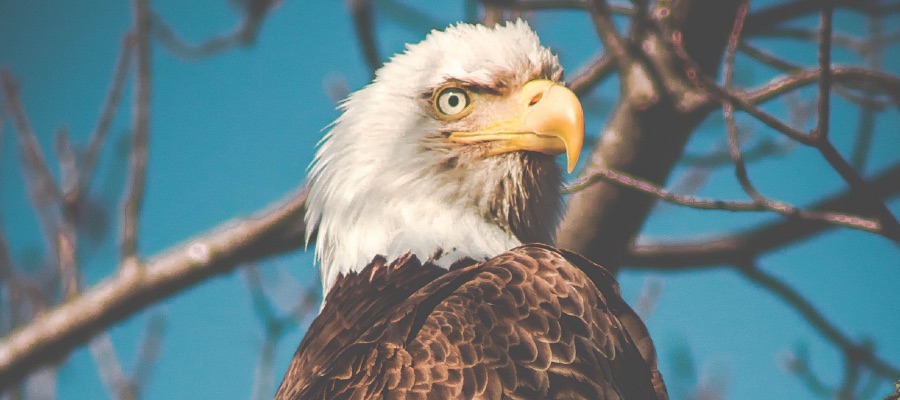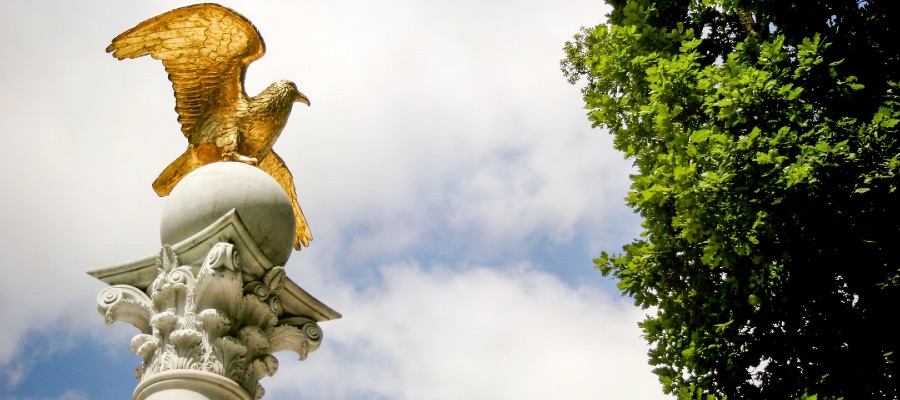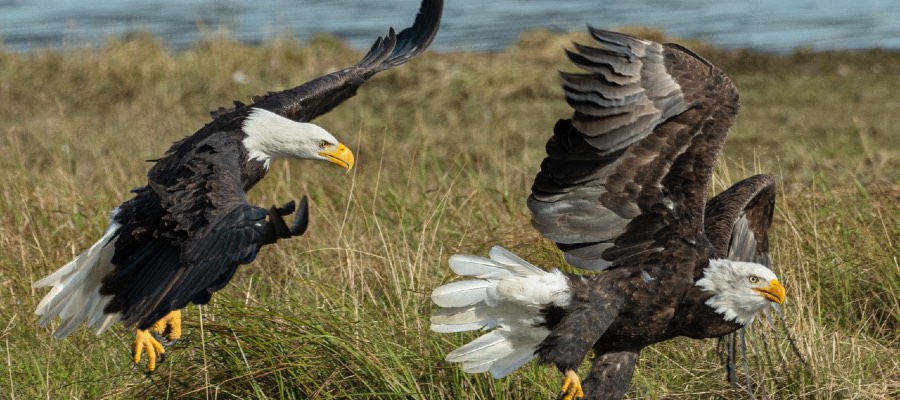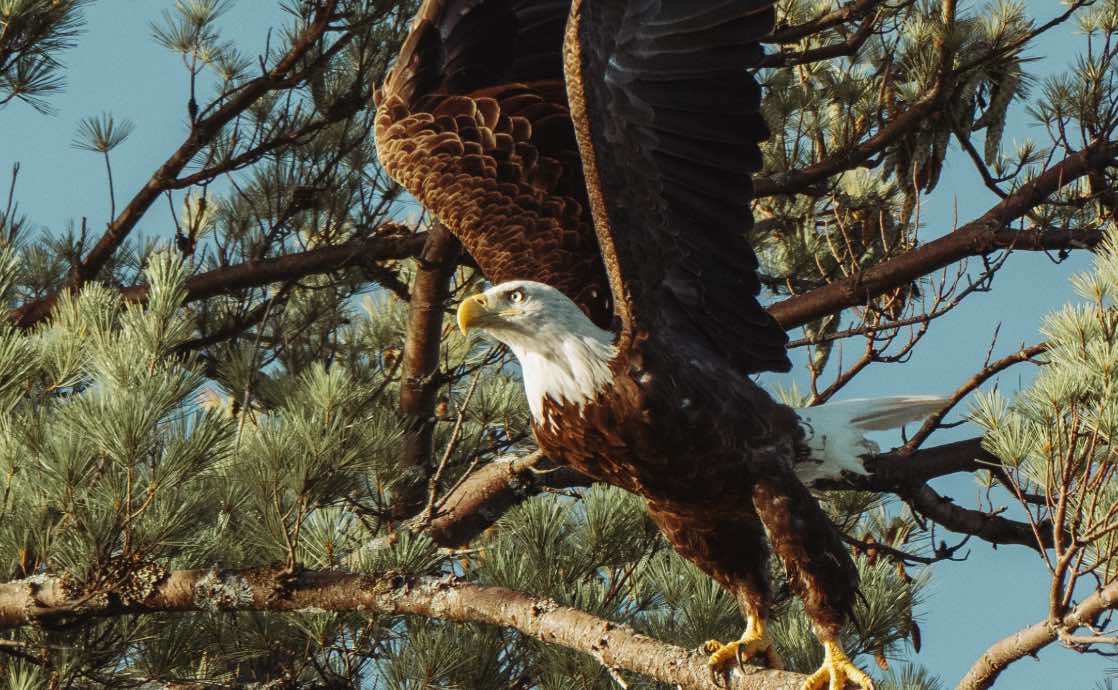The views expressed in our content reflect individual perspectives and do not represent the authoritative views of the Baha'i Faith.
Eagles are resilient, independent, and powerful.
Bald eagles, for example, can fly up to 10,000 feet high, dive at a speed of up to 100 mph, and live around 20-30 years in the wild. Although they are solitary animals, they are also monogamous and raise their children with their lifelong mate.
RELATED: The Spiritual Meaning and Symbolism of Sparrows
Since the bald eagle is the national bird of the United States, it’s no surprise that this bird is admired by many. In fact, the spiritual meaning and symbolism of eagles can be found in many religious writings, especially the Baha’i Faith.
Symbols of Strength

As a bird of prey, eagles are one of the largest and strongest birds alive. Perhaps that’s why they are often regarded as symbols of strength. Abdu’l-Baha, one of the central figures of the Baha’i Faith, referred to the Apostles of Christ as eagles:
“After the death of Christ the Apostles were troubled and diverged in their thoughts and opinions; later they became steadfast and united,” recalled Abdu’l-Baha, in a talk in the early 1900s. “At Pentecost they gathered together, detached themselves from the world, forsook their own desires, renounced all earthly comfort and happiness, sacrificed body and soul to their Beloved, left their homes, took leave of all their cares and belongings, and even forgot their own existence.”
When they became steadfast in the spiritual teachings of Christ and let their love for God guide them, they received divine assistance and were animated by the power of the Holy Spirit. Abdu’l-Baha explained:
They were mere drops and became the ocean; they were feeble gnats and became soaring eagles; they were all weakness and became endowed with strength.
They were like mirrors that reflected the light and attributes of God. Baha’is believe that the Teachings of God are healing for our minds and hearts. They clear our heads, bring awareness, and give us hope. As we strive to uplift and better society, the Baha’i writings ask us to not look at our capacity or worthiness, but instead rest our hopes on the “help and loving-kindness, the favors and bestowals of Bahá’u’lláh” — the prophet and founder of the Baha’i Faith. His name literally translates to the “Glory of God.”
Abdu’l-Baha also wrote:
Be constantly attached to and seek always the confirmations of Bahá’u’lláh for these turn the drop into a sea and convert the gnat into an eagle.
With the aid of God and His prophets, any fragility or feebleness we may have can be transformed into might and power.
Symbols of Triumph and Success

Eagles can also symbolize triumph and success. Their ability to fly thousands of feet high and soar spiritually represents us living up to our potentials and achieving our goals. In a prayer revealed by Abdu’l-Baha, it says:
O Lord! Should Thy tender care be vouchsafed unto us, each one of us would, even as an eagle, soar to the pinnacle of knowledge, but were we left to ourselves we would be consumed away and would fall into loss and frustration. Whatever we are, from Thee do we proceed and before Thy threshold do we seek refuge.
Thou art the Bestower, the Bountiful, the All-Loving.
The Universal House of Justice, the global governing body of the Baha’i Faith, emphasized that we should all “assume a posture of humility, a condition in which one becomes forgetful of self, placing complete trust in God, reliant on His all-sustaining power and confident in His unfailing assistance, knowing that He, and He alone, can change the gnat into an eagle…”
They further explained that our journey of spiritual transformation is characterized by our selflessness, as we focus on encouraging and celebrating the spiritual growth of others.
Symbols of Disunity

Although there are so many attributes to admire about eagles, they also have their own flaws that we should avoid. That’s why the Baha’i writings also use eagles to symbolize disunity and discord. Abdu’l-Baha said:
Among birds we see evidences of instinctive fellowship and love. But the ferocious animals and birds of prey are just the reverse of the domestic.
…Their ferocity is instinctive. There is a creative reason for it. Birds of prey, like eagles and hawks, live solitary and build their nests apart, but doves fly in flocks and nest in the same branches. When an eagle meets another eagle, there is a furious battle. The meeting of two doves is a peace meeting. Therefore, it is evident that these blessed characteristics as well as the reverse are found among the creatures of a lower kingdom.
The Baha’i teachings call humanity to avoid all hatred and discord, because when people become ferocious, they are “more cruel and malicious than the most savage” animals ever created. Instead, the central figures of the Baha’i Faith encouraged us to gather, or flock, together in a spirit of gentleness and love.
In the words of Abdu’l-Baha:
Bahá’u’lláh said that we should love even our enemies and be to them as friends. If all men were obedient to this principle, the greatest unity and understanding would be established in the hearts of mankind.
















Comments
Sign in or create an account
Continue with Googleor